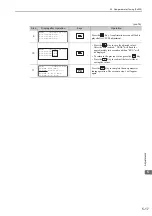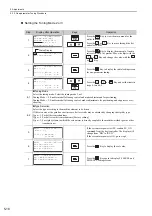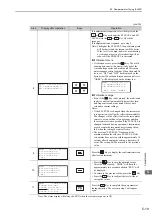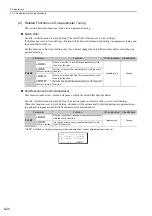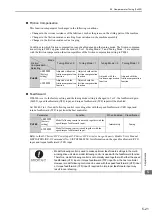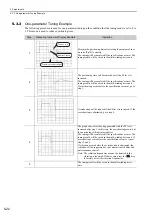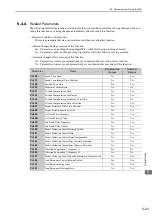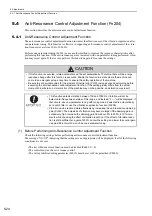
5.5 Vibration Suppression Function (Fn205)
5-31
5
Adjustments
5.5
Vibration Suppression Function (Fn205)
The vibration suppression function is described in this section.
5.5.1
Vibration Suppression Function
The vibration suppression function suppresses transitional vibration at frequency as low as 1 to 100 Hz that is
generated mainly when positioning if the machine stand vibrates.
Perform one-parameter tuning (Fn203) if required to improve the response characteristics after performing
this function.
(1) Preparation
Check the following settings before performing the vibration suppression function.
The message “NO-OP” indicating that the settings are not appropriate will be displayed, if all of the following
conditions are not met.
• The control must be set to position control.
• The test without a motor function must be disabled (Pn00C.0 = 0).
• The write prohibited setting parameter (Fn010) must be set to Write permitted (P.0000).
(2) Items Influencing Performance
If continuous vibration occurs when the servomotor is not rotating, the vibration suppression function cannot
be used to suppress the vibration effectively. If the result is not satisfactory, perform anti-resonance control
adjustment function (Fn204) or one-parameter tuning (Fn203).
CAUTION
• If this function is executed, related parameters will be set automatically. Therefore, there will be a large
response change after this function is enabled or disabled. Enable the function in a state where the
machine can come to an emergency stop at any time to ensure the safety operation of the machine.
• Be sure to set a suitable value for the moment of inertia ratio (Pn103) using advanced autotuning before
executing the vibration suppression function. If the setting greatly differs from the actual moment of inertia
ratio, normal control of the multi-winding drive unit may not be possible, and vibration may result.
• Phase control of the MP2000 Series may not be possible, if the vibration suppression function is per-
formed when using the MP2000 Series with phase control.
• This function detects vibration frequency between 1 to 100 Hz. Vibration will not be
detected for frequencies outside of this range, and instead, "F-----" will be displayed.
• Frequency detection will not be performed if no vibration results from position error or
the vibration frequencies are outside the range of detectable frequencies. If so, use a
device, such as a displacement sensor or vibration sensor, to measure the vibration
frequency.
• If vibration frequencies automatically detected are not suppressed, the actual fre-
quency and the detected frequency may differ. Fine-tune the detected frequency if
necessary.

